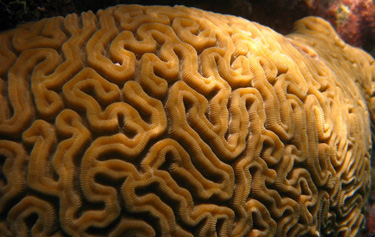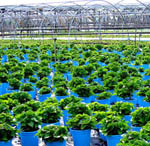Improving water quality may help corals resist climate change
Overview
Scientists warn that climate change could wipe out coral reefs as we know them by 2030. One threat is warming water temperatures, which lead to large-scale bleaching events that can kill corals over vast areas of the ocean. Such global challenges can make local management seem inadequate. But a recent study in Ecological Applications finds that resistance to bleaching is in part dependent upon concentrations of dissolved inorganic nitrogen (DIN), a water quality factor that can be regulated by local management.
Background Brain coral (Diploria labyrinthiformis). Image credit, Jaro Nemčok.
Brain coral (Diploria labyrinthiformis). Image credit, Jaro Nemčok.
The results stem from a new understanding of the bleaching process. Under normal conditions, endosymbiotic algae (zooxanthellae) provide their host corals with extra fixed-carbon from photosynthesis, which fuels the production of coral tissue, skeleton and gametes. “Bleaching” occurs when corals expel their zooxanthellae - a known stress response to high solar irradiance and warm sea surface temperatures. Researcher Scott Wooldridge, in related studies, determined that if the zooxanthellae re-grow too quickly relative to the availability of CO2 after an expulsion event it can re-trigger expulsion furthering the bleaching process. Because increases in zooxanthellae growth rates are exacerbated by higher levels of external seawater DIN, Wooldridge and fellow researcher Terry Done wanted to test if DIN levels could explain past bleaching events and thereby help predict future vulnerabilities.
Study details
The researchers analyzed data from the Great Barrier Reef by looking at aerial surveys of past bleaching events in 1998 and 2002 along with sea surface temperature data and an index of water quality based on “risk” of exposure to DIN-rich terrestrial run off. The study results indicate that water quality plays a role in causing coral bleaching. When they added water quality data to a model based on just heat-stress, they improved the predictive accuracy of where coral bleaching had occurred from 73% to 84%.
The researchers found evidence that high DIN reduces the resistance of corals to bleaching. They inputted their data into a model to determine geographic areas of low and high resistance to bleaching. They found that high resistance to coral bleaching was most probable at locations with good water quality and low thermal history. Overall, the analysis showed that in nutrient-rich coastal waters (i.e. areas prone to high DIN levels), corals essentially bleached sooner—the bleaching threshold was reduced approximately 1-1.5℃.
Implications
Management strategies to limit nutrient input on reefs are already in place (or proposed) in some regions with the intent to limit growth of fleshy algae that can smother corals. Because excess seawater nitrogen also fuels growth of zooxanthellae, such management actions may also help increase coral resistance to temperature rise. Effective, large-scale water quality management therefore offers great potential for locally-driven climate change mitigation for coral reefs, especially nearshore. However, land-based DIN is not the only source, and upwelling can bring nutrient rich waters to offshore reefs. Future mapping and analysis of these upwelled sources of DIN could help predict where offshore coral reef bleaching is more likely to occur.
--Reviewed by Marah Hardt
Wooldridge, S., & Done, T. (2009). Improved water quality can ameliorate effects of climate change on corals Ecological Applications DOI: 10.1890/08-0963.1




 Climate
Climate
Reader Comments